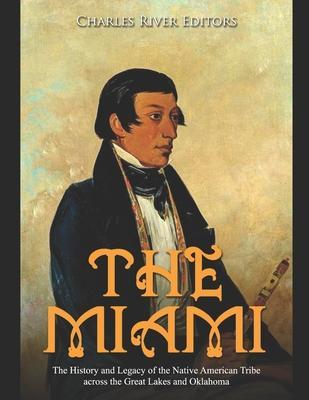The Miami: The History and Legacy of the Native American Tribe across the Great Lakes and Oklahoma

The Miami: The History and Legacy of the Native American Tribe across the Great Lakes and Oklahoma
*Includes online resources and a bibliography for further reading
When the American Revolution ended, the United States and Britain reached an impressively comprehensive peace in the Treaty of Paris. Among the important terms of the treaty, Britain recognized the colonies as free and relinquished territorial claims to them. The two sides then negotiated the boundaries that separated the United States from the British colonies in present-day Canada. Additionally, the British and Americans strove to share certain waters, including the Mississippi River and the fishing waters off Newfoundland. Finally, the two sides made mutual promises regarding paying debts and returning property that had been confiscated during the war, including slaves.
The new United States was faced with a fundamental problem: to expand, it had to settle lands to the west of the Appalachian Mountains, ceded to it by the British. However, the mountains were occupied by Native American groups who had no desire to make way for white settlers. The treaty had created a vast frontier for the fledgling nation, and any American settlers pushing west along it were bound to encounter hostile natives.
For the most part, the conflicts that followed consisted mostly of the Native Americans suffering defeat in the face of a better-equipped adversary, interspersed with binding treaties, which, on the side of the federal government, proved not very binding at all. Occasionally, however, there arose a Native American leader of such ability that such defeats were temporarily reversed, and Little Turtle, the war chief of the Miami tribe, was one such man. Under his leadership, a confederation of Miami and other tribes inflicted the worst defeat ever suffered by an American army in the newly independent nation. Almost a quarter of the Army's total strength was lost in a single battle, but while later Native American leaders such as Sitting Bull and Crazy Horse have become legends, Little Turtle is not as well-remembered. This is particularly odd, given that he actually defeated the American military and helped shape the development of the nascent United States and its military.
As for Little Turtle's people, the Miami originally called themselves Twightwee, after the cry of the crane, their symbol. Like the majestic crane, they are a quiet, but powerful people. "Miami" is actually derived from the name that the tribe was called by the Ojibwe Indians, Myaamia, which means
PRP: 86.34 Lei
Acesta este Prețul Recomandat de Producător. Prețul de vânzare al produsului este afișat mai jos.
69.07Lei
69.07Lei
86.34 LeiLivrare in 2-4 saptamani
Descrierea produsului
*Includes online resources and a bibliography for further reading
When the American Revolution ended, the United States and Britain reached an impressively comprehensive peace in the Treaty of Paris. Among the important terms of the treaty, Britain recognized the colonies as free and relinquished territorial claims to them. The two sides then negotiated the boundaries that separated the United States from the British colonies in present-day Canada. Additionally, the British and Americans strove to share certain waters, including the Mississippi River and the fishing waters off Newfoundland. Finally, the two sides made mutual promises regarding paying debts and returning property that had been confiscated during the war, including slaves.
The new United States was faced with a fundamental problem: to expand, it had to settle lands to the west of the Appalachian Mountains, ceded to it by the British. However, the mountains were occupied by Native American groups who had no desire to make way for white settlers. The treaty had created a vast frontier for the fledgling nation, and any American settlers pushing west along it were bound to encounter hostile natives.
For the most part, the conflicts that followed consisted mostly of the Native Americans suffering defeat in the face of a better-equipped adversary, interspersed with binding treaties, which, on the side of the federal government, proved not very binding at all. Occasionally, however, there arose a Native American leader of such ability that such defeats were temporarily reversed, and Little Turtle, the war chief of the Miami tribe, was one such man. Under his leadership, a confederation of Miami and other tribes inflicted the worst defeat ever suffered by an American army in the newly independent nation. Almost a quarter of the Army's total strength was lost in a single battle, but while later Native American leaders such as Sitting Bull and Crazy Horse have become legends, Little Turtle is not as well-remembered. This is particularly odd, given that he actually defeated the American military and helped shape the development of the nascent United States and its military.
As for Little Turtle's people, the Miami originally called themselves Twightwee, after the cry of the crane, their symbol. Like the majestic crane, they are a quiet, but powerful people. "Miami" is actually derived from the name that the tribe was called by the Ojibwe Indians, Myaamia, which means
Detaliile produsului










